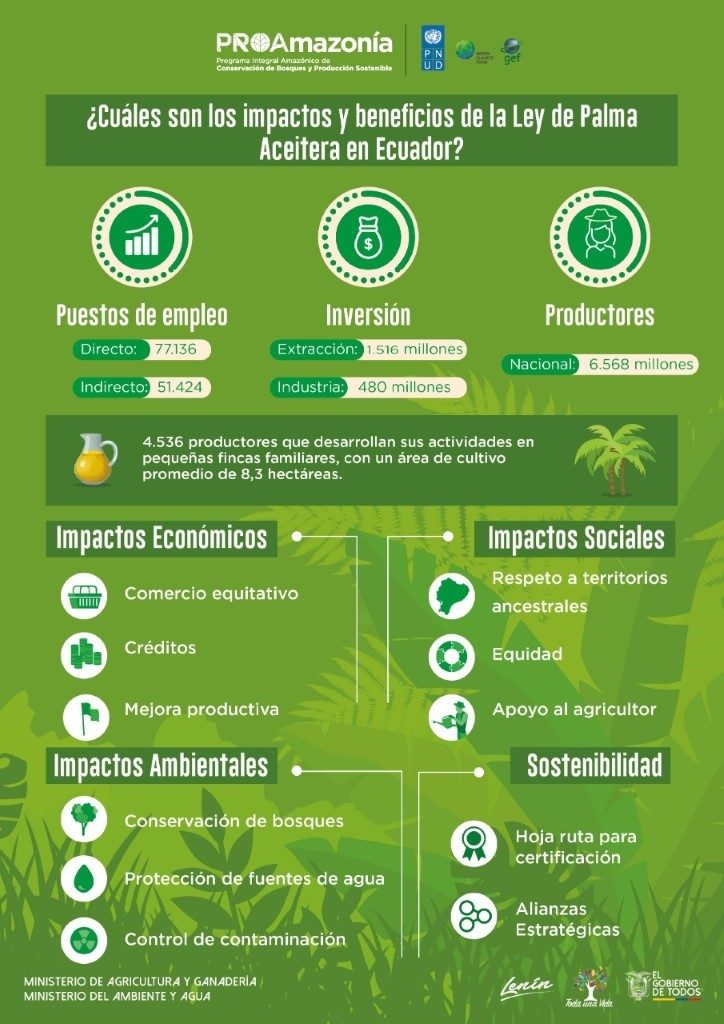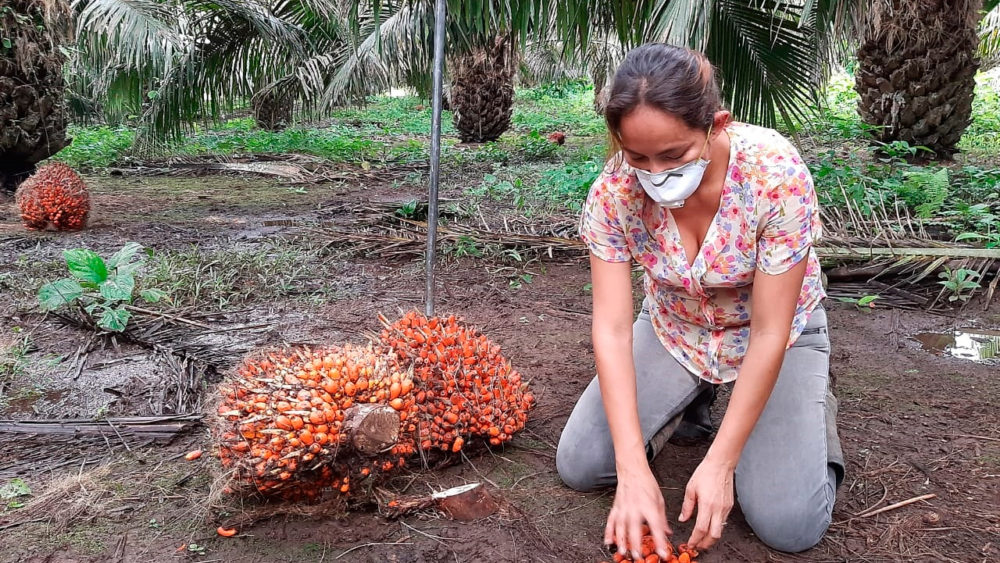In collaboration with the Ministry of Environment and Water, the Ministry of Agriculture and Livestock, and producer organizations, PROAmazonía participated in the development of the draft Oil Palm Law. This instrument promotes the sustainable development of the chain and was approved on June 2, 2020 by the National Assembly.
Oil palm in Ecuador has been described as a growing, stable and successful productive chain; however, the situation has changed in recent years.
Between 1993 and 2017, the sector went from producing 153 thousand tons of palm oil, exclusively used to partially cover national demand, to producing 555 thousand tons, 320 thousand tons of which was exported according to information from the Central Bank of Ecuador.The trend has changed. Last year, for example, palm oil exports were 216 thousand tons. This reduction represented a loss of export earnings of more than 74 million dollars. Considering that in 2017, the average oil production per hectare was 2.2 tons, this change implies a loss of more than 47 thousand hectares and an investment of more than 200 million dollars.
The causes are various and complex, but they include variations in the international price of palm oil, increased local production costs and major phytosanitary problems, such as Bud Rot, a catastrophic disease that affects the 57% of the plantations nationwide.
The Law for Strengthening and Developing the Production, Marketing, Extraction, Exportation and Industrialization of Oil Palm and its Derivatives was a comprehensive response to this negative situation. This law seeks to regulate, promote, incentivize and stimulate the productive chain, under principles of legality, equity, productivity, sustainability, transparency, sovereignty, food security, and economic and social inclusion.
The Law for Strengthening and Developing the Production, Marketing, Extraction, Exportation and Industrialization of Oil Palm and its Derivatives was a comprehensive response to this negative situation. This law seeks to regulate, promote, incentivize and stimulate the productive chain, under principles of legality, equity, productivity, sustainability, transparency, sovereignty, food security, and economic and social inclusion.
The Palma Law was developed in a participatory manner, based on the criteria of representatives of the government, civil society and this economic sector. PROAmazonía provided technical criteria to strengthen the productive, commercial, social and environmental parts of the document to ensure that it can serve as a basis for sustainable development of the crop. PROAmazonía also served as a catalyst for consensus among the different links in the production chain.
Like any agricultural development law, it involves technical criteria such as productivity, high-quality genetic material, plant health, research, and access to irrigation and drainage, all of which focus on solving problems that affect the producer on a daily basis.
However, it also considers sustainability to be a basic principle, and avoids traditional measures that reduce the competitiveness of the value chain; it proposes new schemes and/or innovative mechanisms to improve marketing, invest safely and diversify markets.
The law includes measures that promote equitable, transparent and sustainable business relationships over time; it establishes criteria for designing loans suitable to the reality of the crop and producers, it gives chain participants the responsibility for generating the necessary information for future planning of the sector.
This instrument regulates environmental protection in all the links of the productive chain and establishes the Interinstitutional Committee for Monitoring Sustainable Palm – CISPS as one of the entities in charge of coordinating research activities and developing national policy on the production of biodiesel. It is also the first agricultural development law that mentions respect for ancestral territories, protection of water sources for human consumption and penalties for those who do not respect the agro-ecological zoning of the crop to conserve forests, water protection areas and natural ecosystems. It is the first law that orders a productive sector to generate a roadmap in order to obtain sustainability certifications.
Being such an ambitious law, its implementation poses several challenges. To achieve its purpose, coordinated work among several state institutions (MAAE, MAG, MPCEIP, among others) will be necessary, as well as the continual efforts of the more than 6,500 stakeholders in the production chain. PROAmazonía will support its partners on this path. The challenges are great, but the desire to strengthen the sustainability of a sector on which more than 120 thousand families depend every day is greater.

Author: Santiago Rosero
PROAmazonía Specialist in Sustainable Palm
 Español
Español English
English
